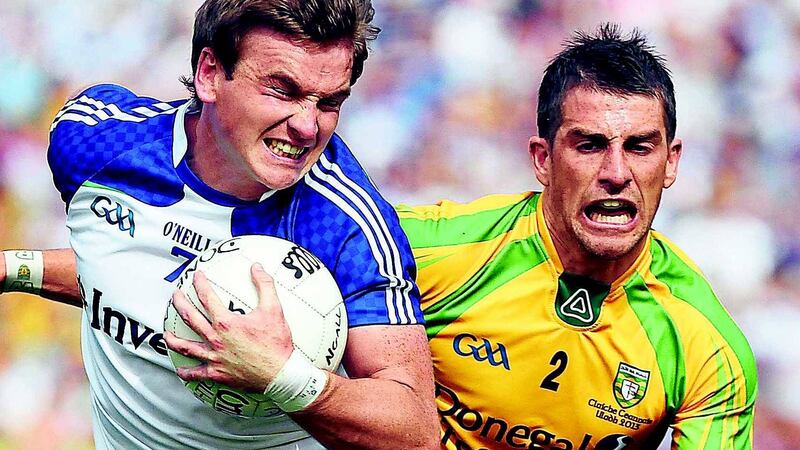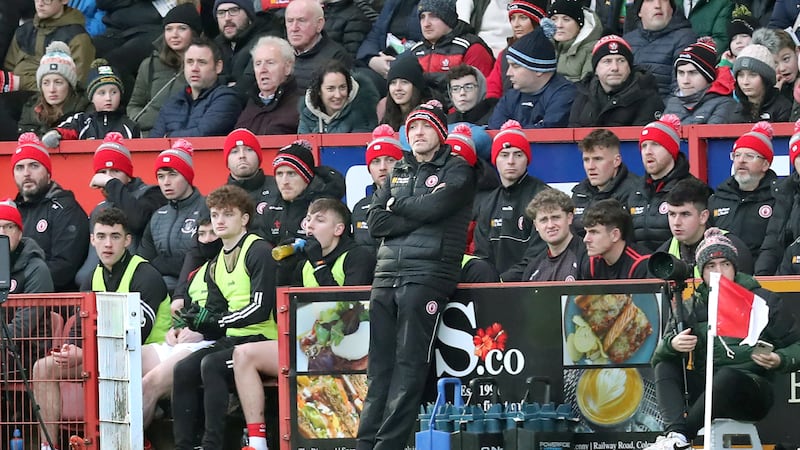AMID the delirious scenes at the tunnel entrance of the Gerry Arthurs Stand, Seamus 'Banty' McEnaney appeared out of nowhere, strode through the army of reporters and stewards, sought out winning manager Malachy O'Rourke and offered his hearty congratulations.
Seconds later, Banty was gone. He'd become submerged in the magical sea of blue and white just yards away.
Banty remains the Don Vito Corleone of Monaghan football. Anyone who follows Gaelic football genuinely misses his roguish presence on the inter-county stage. Curled wrists, the Corduff man was in a permanent state of war on the sidelines.
The Monaghan team was the mirror image of their manager. Monaghan played with a warrior spirit that always made football's aristocracy appear decidedly uncomfortable. Tommy Freeman, one of the great warhorses of Monaghan football for 10 years or more, remembered a few men that didn't quite reach the Holy Grail of Ulster but helped lay the foundations along the road. "Damien, my brother, JP Mone, Rory Woods, Dermot McArdle, Seamus 'Banty' McEnaney, all his backroom team... a lot of men have soldiered these last couple of years with this Monaghan team and came so close and didn't get the credit they deserve," said Freeman. "This Ulster title is for every one of those people."
After two Ulster final defeats - in 2007 and 2012 - Monaghan had finally triumphed.
Often derided for their over-physical approach over the years, Darragh O Se wrote a fine piece in The Irish Times on his encounters with Monaghan. "I would never say Monaghan were a dirty team, but by God they were physical," wrote O Se. "Monaghan were a 48-hour team for me. Some counties you played against, you felt it the next morning. But after a Monaghan game, I'd be sore on the Tuesday." If anything, there is less of the dark arts about this current Monaghan team than Banty's crew. Indeed, the evolution of Monaghan can be illustrated through Dessie Mone. Regarded as a touch-tight man-marker during Banty's days, the Clontibret man is now an attack-minded wing half-back and was one of the players of this year's Ulster Championship. Credit, in no small part, is due to former boss Eamonn McEneaney who felt there was more football in Mone than condemning him to the corner-back position for the rest of his days.
Monaghan, nevertheless, have lost none of their defensive prowess, evidenced by the man-marking abilities of Drew Wylie, Vinny Corey and Colin Walshe in their resounding victory over Donegal last month.
They still play an uncompromising brand of football - who doesn't nowadays? - but in Darren Hughes, Kieran Hughes, Conor McManus and Paul Finlay they are a more expansive unit under Malachy O'Rourke.
In his second stint as an inter-county manager, Malachy O'Rourke cuts a more relaxed figure on the sidelines. One of the most affable men on the managerial circuit, the Derrylin man was reluctant to hog the limelight in the aftermath of Monaghan's first provincial success in 25 years.
He didn't want to talk about the near-miss with Fermanagh in 2008. The day, he said, belonged entirely to the Monaghan players. And defeated Donegal manager Jim McGuinness said all the right things after missing out on an historic three in-a-row. "Monaghan," McGuinness told reporters, "have made the
breakthrough today and you wouldn't deny the people of Monaghan and the players of Monaghan that. "It's absolutely incredible to be part of a day like this and we were very fortunate to experience it and it's up to them to enjoy it."
In the same post-match interview, the Donegal manager was asked about the nature of the tackle that ended Mark McHugh's involvement after just 10 minutes. "Ach, no listen, I don't think there was much in it," he said.
Like McGuinness, the press reporters housed at the back of the Gerry Arthurs Stand had one chance to view Stephen Gollogly's tackle on McHugh.
Contrary to popular belief, reporters don't have the facility of TV monitors in the press box.
We have to make snap judgement calls.
On further viewing, McGuinness held a very different interpretation of the incident. After Donegal's win over Laois in Carrick-on-Shannon, he implied there was malice in Gollogly's challenge.
In the same article, O Se proffered: "The idea that Stephen Gollogly went out to target Mark McHugh just doesn't stand up... [But] the ball was there to be challenged for. He didn't lift an elbow, he didn't lift a knee or a foot or a fist. "He went in bald-headed and came out of it badly himself."
If McGuinness's intention was to put match official Joe McQuillan under pressure ahead of Donegal's All-Ireland quarter-final meeting with Mayo, he succeeded.
But the Glenties man delivered his lines in such an emotionally-charged manner that they were almost too clunky to be described as mind games.
I believe McGuinness was sincere in his expressed fears that the game is not far away from a serious injury. The game, after all, is played at a faster pace, and the hits are getting stronger.
On the issue of cynical play, McGuinness appeared to be reaching for some moral high ground when there was none available.
To varying degrees, every top team indulges in cynical play.
But when you accuse the opposition of targeting your players, you may be sure your own team's record is whiter than white because what follows is a long-winded exercise in whataboutery.
The vague notion that Donegal have been playing the beautiful game and Tyrone, Monaghan and Down haven't did a disservice to Donegal's opponents.
Donegal have suffered four concussions in three games.
Two of them occurred in the semi-final win over Down.
Kalum King's challenge that forced Frank McGlynn to retire at half-time was over-zealous, but the one that laid out Ryan Bradley - again by King - was a fair one. The Stephen Gollogly tackle on McHugh was a hard hit. No more. No less.
In a contact sport bad injuries occur all the time. But not all of them are pre-meditated.
Four concussions in three games don't necessarily mean four pre-meditated tackles.
It was only right Malachy O'Rourke defended his player and the strategy of his team against Donegal in Tuesday's edition of The Irish News.
In my brief dealings with Jim McGuinness, I've found him to be an immensely likeable and engaging man, but the most disappointing aspect of his post-match interview in Carrick-on-Shannon last Saturday night was his attempts to dilute Monaghan's historic victory in Clones last month.
The Monaghan players, to a man, deserved better.

